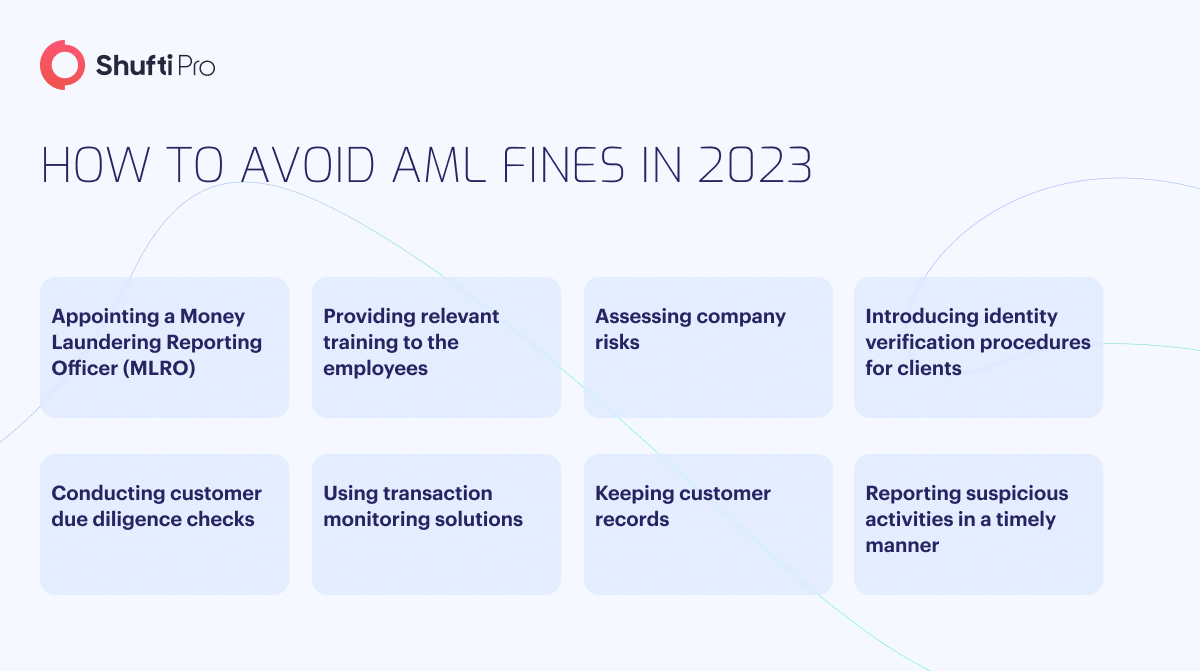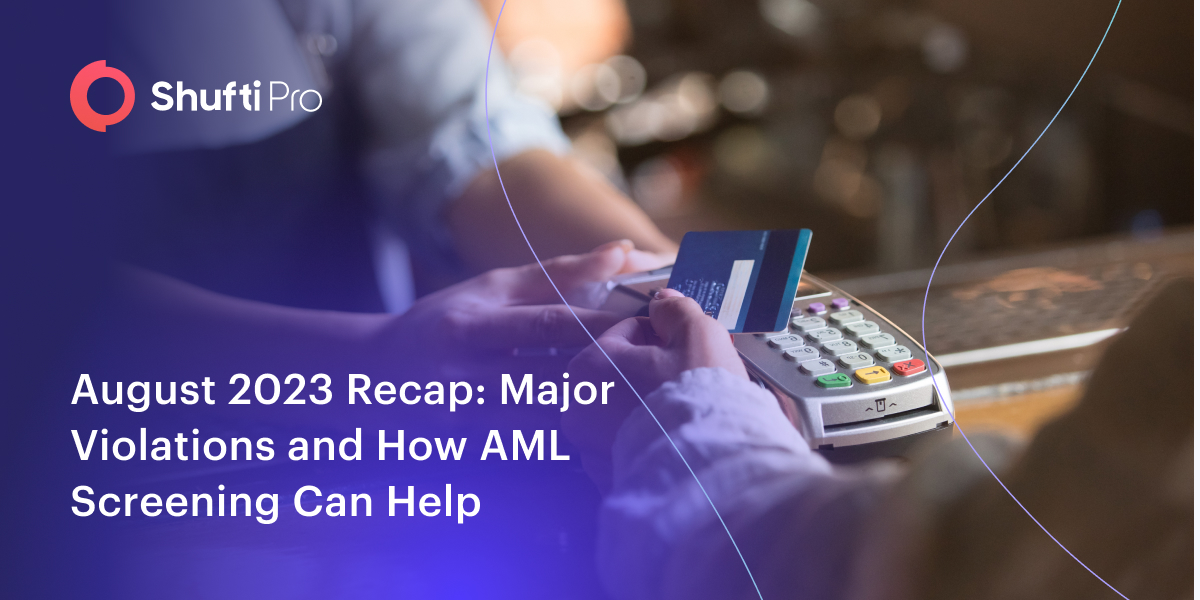July 2023 Recap: Major Compliance Events and How AML Verification Can Help

Anti-Money Laundering (AML) violations pose a substantial and concerning threat to the reliability of the financial industry. These violations include unlawful actions aimed at concealing the origin of illicit funds, thereby facilitating money laundering, terrorist financing, and various other criminal activities. Thus, regulatory authorities and financial institutions are intensifying their efforts to combat these illegal practices.
A Quick Recap of Major Compliance Events in July 2023
FATF Urges Countries to Combat Challenges Associated with Virtual Asset Regulations
Almost 75% of countries within the Financial Action Task Force (FATF) membership either do not adhere or only partially comply with Recommendation 15 concerning Virtual Asset Service Providers (VASPs). The FATF reveals that over half of the surveyed jurisdictions have not yet implemented the travel rule, which the FATF regards as a “serious concern.” The report states that urgent action is needed, stressing the need for these jurisdictions to implement and enforce Recommendation 15 promptly.
The travel rule necessitates Virtual Asset Service Providers (VASPs) to exchange information regarding the originator, beneficiary, and virtual asset transactions. Nonetheless, the FATF underscores the importance of enhancing interoperability between different solutions and across jurisdictions.
To enhance the implementation of Recommendation 15, the FATF has established an implementation roadmap. This roadmap involves providing outreach and assistance to jurisdictions with limited capacity and publicly identifying jurisdictions’ progress in implementing recommendations for significant VASP activities. Additionally, the FATF will conduct further reviews to assess progress and overcome challenges, ensuring full implementation by June 2024.
MALACAÑANG Orders Government Agencies to Implement AML Plans and Programmes
The Philippine president’s official residence and primary workplace, MALACAÑANG Palace, have instructed all relevant government agencies to exit the FATF grey list by January 2024. The directive mandates implementing plans to combat financial crimes like money laundering. Moreover, the order included activities aimed at countering proliferation financing under the purview of the national committee.
The order emphasises that adopting an updated National Action Plan on Combating Money Laundering and Countering the Financing of Terrorism and Proliferation (NACS 2023-2027) will bolster existing measures. The Anti-Money Laundering Council (AMLC) has welcomed the executive order, recognising it as a testament to the government’s unwavering commitment to fortifying efforts against illicit financial activities. The AMLC also acknowledges that the NACS 2023-2027 will provide strategic direction and coordinated efforts to address the remaining action plan items identified by the International Cooperation Review Group (ICRG). Thus, it will facilitate the country’s exit from the FATF grey list.
CBN Adds Cameroon, Korea, Vietnam, and Croatia to Money Laundering Watchlist
The Central Bank of Nigeria has issued a circular to Deposit Money Banks (DMBs), adding Cameroon, Korea, Vietnam, and Croatia to the money laundering watchlist. In response to this action, the CBN has instructed banks to conduct more comprehensive transaction monitoring of organisations and individuals from these countries to prevent money laundering.
Considering the recent inclusion of these countries on the FATF grey list, Nigerian banks and other financial institutions are advised to exercise vigilance in monitoring transactions involving these nations. The FATF is critical in identifying and promoting measures to combat terrorism financing, proliferation, and money laundering.
The Director of the Financial Policy and Regulation Department, Chibuzo A. Efobi, issued the circular concerning this directive. The CBN considers Korea, Iran, and Myanmar high-risk jurisdictions subject to the FATF’s ‘Call for Action.’
As part of intensified FATF monitoring, countries are collaborating to address strategic deficiencies in their financing regimes related to terrorism financing, money laundering, and proliferation. Additionally, banks are encouraged to closely monitor transactions involving Myanmar, Iran, and the Democratic People’s Republic of Korea due to their elevated risk profile for financial institutions.
FCA Warns Against Unregistered Crypto ATM Use
The Financial Conduct Authority (FCA) has initiated actions against unauthorised crypto ATMs in the UK, posing potential risks of fund loss to users. If an error occurs while using an unregistered cryptocurrency machine, users could be exposed to substantial financial risks, potentially resulting in the loss of funds. The FCA has expressed its commitment to continue its efforts against unlicensed crypto ATMs operating in the UK. The regulator has conducted inspections at various suspected locations nationwide in a coordinated operation involving other law enforcement agencies.
Despite regular warnings from the FCA, cryptoassets remain unregulated and carry high risks, leaving consumers with limited protection in case of mishaps. The FCA mandates crypto asset exchange providers to register under UK money laundering regulations to address this.
A notable case highlighted by the FCA involved an individual who deposited £1,000 into a crypto ATM but encountered a failed transaction without the funds being returned. Unfortunately, the person could not contact the machine’s operator to seek a resolution. Consequently, the affected crypto ATMs were taken out of service following an inspection by the FCA.

AML Verification to the Rescue
Failure to comply with AML regulations can lead to severe repercussions, such as substantial fines, damage to reputation, and legal liabilities. AML verification involves thoroughly screening customers against global sanctions and watchlists. By implementing this process, businesses ensure they do not engage in transactions with individuals, organisations, or countries under sanctions, effectively protecting themselves from non-compliance fines arising from prohibited dealings.
How Can Shufti Help?
Shufti, a leading global identity verification provider, offers a comprehensive range of AML solutions that effectively assist businesses in avoiding AML fines.
Here is how our AML solution helps in mitigating the risk of financial fraud and ensuring regulatory adherence:
- Robust AML Screening: Our AML screening service allows businesses to screen customers and financial transactions against global sanctions lists, watchlists, and Politically Exposed Persons (PEP) databases. By identifying high-risk individuals and entities, businesses can prevent potential dealings with sanctioned parties, reducing the risk of AML violations and associated fines.
- Audit Trail and Reporting: Our AML verification process maintains comprehensive records and audit trails of verification activities. These detailed reports enable businesses to showcase their compliance efforts to regulatory authorities, facilitating the avoidance of fines and penalties during audits.
- Customisable Solutions: Our AML solutions are fully customisable, allowing businesses to tailor their compliance measures to specific regulatory requirements and risk profiles. This flexibility ensures that companies stay current with evolving AML regulations, minimising the risk of non-compliance fines due to outdated procedures.
- Expert Support and Training: Shufti offers specialist support and training to businesses on AML compliance best practices. This guidance helps companies to establish a robust AML compliance framework, fostering a culture of vigilance and proactive risk management.
Still confused about how our AML solution helps businesses avoid hefty fines?










































































